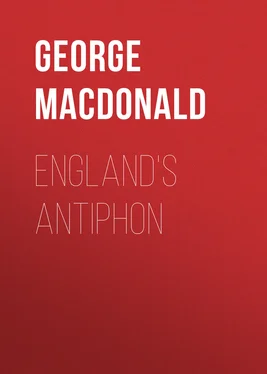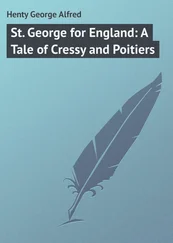George MacDonald - England's Antiphon
Здесь есть возможность читать онлайн «George MacDonald - England's Antiphon» — ознакомительный отрывок электронной книги совершенно бесплатно, а после прочтения отрывка купить полную версию. В некоторых случаях можно слушать аудио, скачать через торрент в формате fb2 и присутствует краткое содержание. Издательство: Иностранный паблик, Жанр: foreign_poetry, Поэзия, foreign_antique, foreign_prose, на английском языке. Описание произведения, (предисловие) а так же отзывы посетителей доступны на портале библиотеки ЛибКат.
- Название:England's Antiphon
- Автор:
- Издательство:Иностранный паблик
- Жанр:
- Год:неизвестен
- ISBN:нет данных
- Рейтинг книги:3 / 5. Голосов: 1
-
Избранное:Добавить в избранное
- Отзывы:
-
Ваша оценка:
- 60
- 1
- 2
- 3
- 4
- 5
England's Antiphon: краткое содержание, описание и аннотация
Предлагаем к чтению аннотацию, описание, краткое содержание или предисловие (зависит от того, что написал сам автор книги «England's Antiphon»). Если вы не нашли необходимую информацию о книге — напишите в комментариях, мы постараемся отыскать её.
England's Antiphon — читать онлайн ознакомительный отрывок
Ниже представлен текст книги, разбитый по страницам. Система сохранения места последней прочитанной страницы, позволяет с удобством читать онлайн бесплатно книгу «England's Antiphon», без необходимости каждый раз заново искать на чём Вы остановились. Поставьте закладку, и сможете в любой момент перейти на страницу, на которой закончили чтение.
Интервал:
Закладка:
They would seem likewise to have been first represented in churches and chapels, sometimes in churchyards. Later, when the actors chiefly belonged to city-guilds, they were generally represented in the streets and squares.
It must be borne in mind by any who would understand the influence of these plays upon the people, that much in them appearing to us grotesque, childish, absurd, and even irreverent, had no such appearance in the eyes of the spectators. A certain amount of the impression of absurdity is simply the consequence of antiquity; and even that which is rightly regarded as absurd in the present age, will not at least have produced the discomposing effects of absurdity upon the less developed beholders of that age; just as the quaint pictures with which their churches were decorated may make us smile, but were by them regarded with awe and reverence from their infancy.
It must be confessed that there is in them even occasional coarseness; but that the devil for instance should always be represented as a baffled fool, and made to play the buffoon sometimes after a disgusting fashion, was to them only the treatment he deserved: it was their notion of "poetic justice;" while most of them were too childish to be shocked at the discord thus introduced, and many, we may well hope, too childlike to lose their reverence for the holy because of the proximity of the ridiculous.
There seems to me considerably more of poetic worth scattered through these plays than is generally recognized; and I am glad to be able to do a little to set forth the fact. I cannot doubt that my readers will be interested in such fragments as the scope and design of my book will allow me to offer. Had there been no such passages, I might have regarded the plays as but remotely connected with my purpose, and mentioned them merely as a dramatic form of religious versification. I quote from the Coventry Miracles , better known than either of the other two sets in existence, the Chester Plays and those of Widkirk Abbey. The manuscript from which they have been edited by Mr. Halliwell, one of those students of our early literature to whom we are endlessly indebted for putting valuable things within our reach, is by no means so old as the plays themselves; it bears date 1468, a hundred and thirty years after they appeared in their English dress. Their language is considerably modernized, a process constantly going on where transcription is the means of transmission—not to mention that the actors would of course make many changes to the speech of their own time. I shall modernize it a little further, but only as far as change of spelling will go.
The first of the course is The Creation . God, and angels, and Lucifer appear. That God should here utter, I cannot say announce, the doctrine of the Trinity, may be defended on the ground that he does so in a soliloquy; but when we find afterwards that the same doctrine is one of the subjects upon which the boy Jesus converses with the doctors in the Temple, we cannot help remarking the strange anachronism. Two remarkable lines in the said soliloquy are these:
And all that ever shall have being
It is closed in my mind.
The next scene is the Fall of Man , which is full of poetic feeling and expression both. I must content myself with a few passages.
Here is part of Eve's lamentation, when she is conscious of the death that has laid hold upon her.
Alas that ever that speech was spoken
That the false angel said unto me!
Alas! our Maker's bidding is broken,
For I have touched his own dear tree.
Our fleshly eyes are all unlokyn, unlocked.
Naked for sin ourself we see;
That sorry apple that we have sokyn sucked.
To death hath brought my spouse and me.
When the voice of God is heard, saying,
Adam, that with my hands I made,
Where art thou now? what hast thou wrought?
Adam replies, in two lines, containing the whole truth of man's spiritual condition ever since:
Ah, Lord! for sin our flowers do fade:
I hear thy voice, but I see thee nought.
The vision had vanished, but the voice remained; for they that hear shall live, and to the pure in heart one day the vision shall be restored, for "they shall see God." There is something wonderfully touching in the quaint simplicity of the following words of God to the woman:
Unwise woman, say me why
That thou hast done this foul folly,
And I made thee a great lady,
In Paradise for to play?
As they leave the gates, the angel with the flaming sword ends his speech thus:
This bliss I spere from you right fast; bar.
Herein come ye no more,
Till a child of a maid be born,
And upon the rood rent and torn,
To save all that ye have forlorn, lost.
Your wealth for to restore.
Eve laments bitterly, and at length offers her throat to her husband, praying him to strangle her:
Now stumble we on stalk and stone;
My wit away from me is gone;
Writhe on to my neck-bone
With hardness of thine hand.
Adam replies—not over politely—
Wife, thy wit is not worth a rush;
and goes on to make what excuse for themselves he can in a very simple and touching manner:
Our hap was hard, our wit was nesche, soft, weak, still in use in
To Paradise when we were brought: [some provinces.
My weeping shall be long fresh;
Short liking shall be long bought. pleasure.
The scene ends with these words from Eve:
Alas, that ever we wrought this sin!
Our bodily sustenance for to win,
Ye must delve and I shall spin,
In care to lead our life.
Cain and Abel follows; then Noah's Flood , in which God says,
They shall not dread the flood's flow;
then Abraham's Sacrifice ; then Moses and the Two Tables ; then The Prophets , each of whom prophesies of the coming Saviour; after which we find ourselves in the Apocryphal Gospels, in the midst of much nonsense about Anna and Joachim, the parents of Mary, about Joseph and Mary and the birth of Jesus, till we arrive at The Shepherds and The Magi, The Purification, The Slaughter of the Innocents, The Disputing in the Temple, The Baptism, The Temptation , and The Woman taken in Adultery , at which point I pause for the sake of the remarkable tradition embodied in the scene—that each of the woman's accusers thought Jesus was writing his individual sins on the ground. While he is writing the second time, the Pharisee, the Accuser, and the Scribe, who have chiefly sustained the dialogue hitherto, separate, each going into a different part of the Temple, and soliloquize thus:
Pharisee . Alas! alas! I am ashamed!
I am afeared that I shall die;
All my sins even properly named
Yon prophet did write before mine eye.
If that my fellows that did espy,
They will tell it both far and wide;
My sinful living if they outcry,
I wot not where my head to hide.
Accuser . Alas! for sorrow mine heart doth bleed,
All my sins yon man did write;
If that my fellows to them took heed,
I cannot me from death acquite.
I would I were hid somewhere out of sight,
That men should me nowhere see nor know;
If I be taken I am aflyght afraid.
In mekyl shame I shall be throwe. much.
Scribe . Alas the time that this betyd! happened.
Right bitter care doth me embrace.
All my sins be now unhid,
Yon man before me them all doth trace.
If I were once out of this place,
To suffer death great and vengeance able, 15 15 Able to suffer, deserving, subject to, obnoxious to, liable to death and vengeance.
I will never come before his face,
Though I should die in a stable.
Интервал:
Закладка:
Похожие книги на «England's Antiphon»
Представляем Вашему вниманию похожие книги на «England's Antiphon» списком для выбора. Мы отобрали схожую по названию и смыслу литературу в надежде предоставить читателям больше вариантов отыскать новые, интересные, ещё непрочитанные произведения.
Обсуждение, отзывы о книге «England's Antiphon» и просто собственные мнения читателей. Оставьте ваши комментарии, напишите, что Вы думаете о произведении, его смысле или главных героях. Укажите что конкретно понравилось, а что нет, и почему Вы так считаете.












